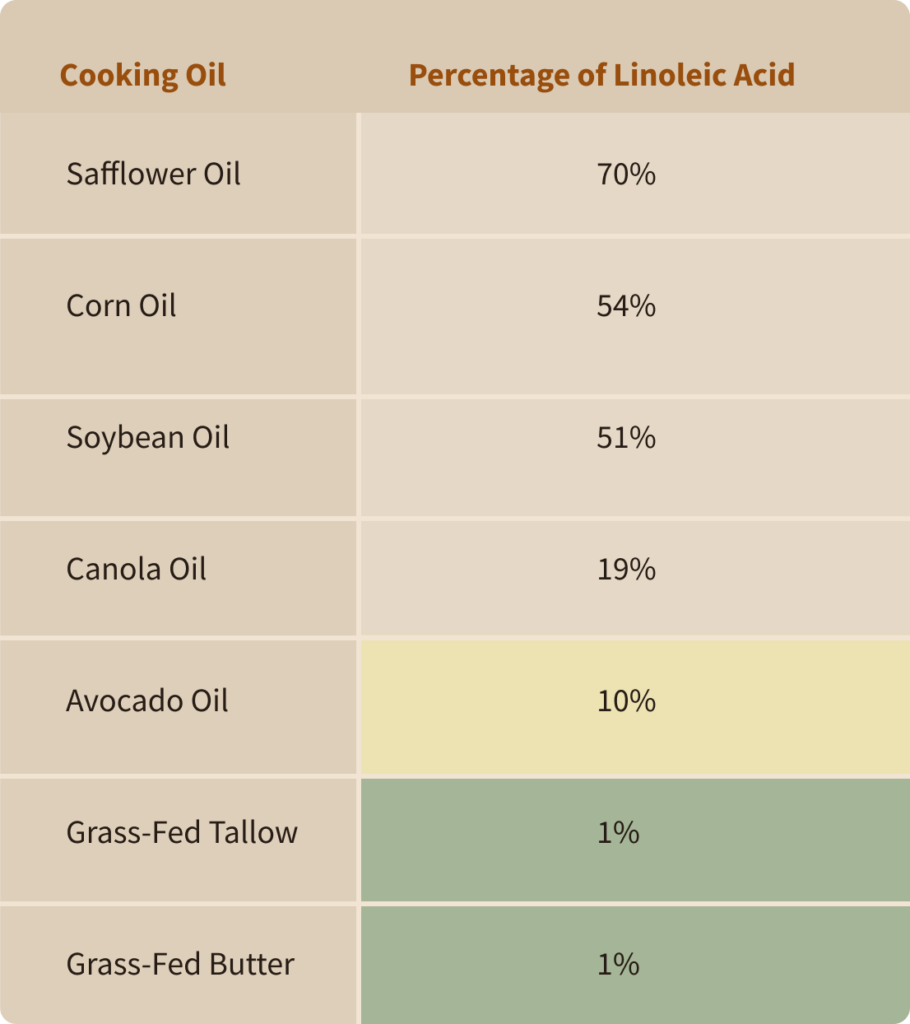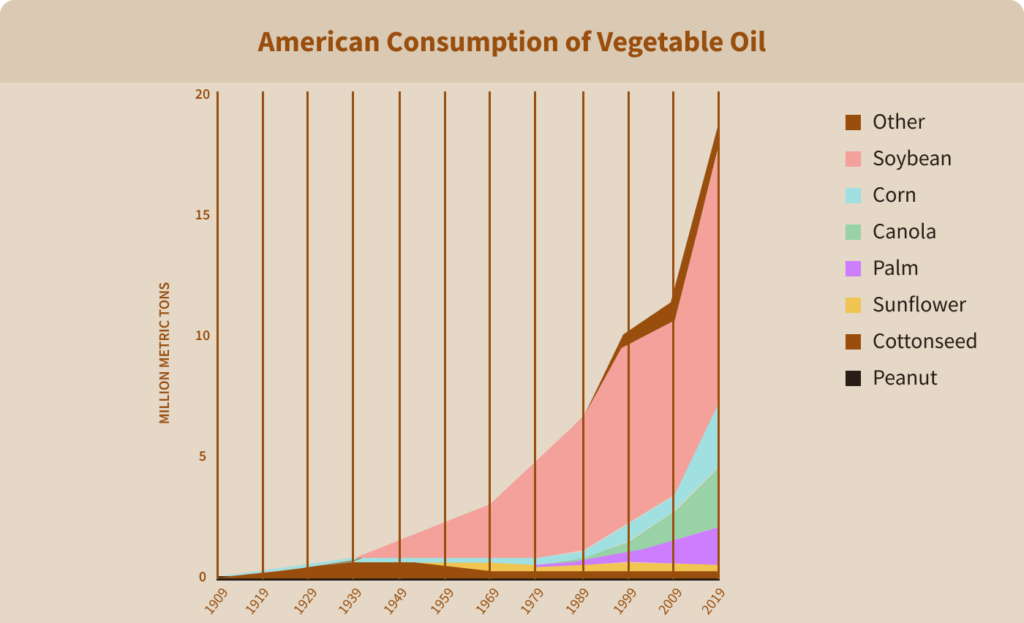PLEASE NOTE: The information in this blog is for educational purposes only. It is not a substitute for professional medical advice. Consult your healthcare provider if you’re seeking medical advice, diagnosis, or treatment.
What do the following foods have in common?
- Salad Dressing
- Fried Foods
- Mayonaise
- Cakes & Cookies
- Margarine
You might be surprised to learn that they all commonly contain an ingredient that didn’t even exist until the 1970s (1). That ingredient is canola oil.
As you’ll see, doctors and organizations like the Food and Drug Administration (FDA) view it as a heart-healthy option, but the proposed benefits are hotly contested. In this article, you’ll learn what canola oil is, why it’s so popular, canola oil dangers, and the best alternatives to add to your diet.
Let’s take a look!
What is Canola Oil?
Canola oil (Canada oil low acid) was developed in Canada in the 1970’s through genetic modification of rapeseed oil (2). Rapeseed oil is naturally high in erucic acid and glucosinolates, which can be toxic in high amounts (3). So, canola oil was developed to reduce both of these components.

Although controversial, canola oil is widely viewed as a “heart-healthy cooking oil” thanks to its low saturated fat content and ability to lower cholesterol levels (4, 5). Canola oil is also rich in linoleic acid, monounsaturated fatty acids, and alpha linolenic acid (ALA)(6).
Used throughout the United States, Japan, Australia, and Europe, canola oil is the third most popular seed oil in the world behind soybean oil and palm oil (7). It’s either sold as a standalone fator used in restaurant fryers, baked goods, salad dressings, and maybe even your favorite oat milk (yes, oat milk).
Due to its perceived health benefits and low cost, canola oil has experienced a meteoric rise in popularity, with a 167% increase in usage during the 13 years after its introduction (8).
But is it as safe as it’s made out to be? Or are canola oil dangers being overlooked? Let’s find out.
Are Seed Oils Healthy or Unhealthy?
Seed oils are a type of vegetable oil that comes from the seeds of crops. Common seed oils like canola oil, soybean oil, sunflower oil, rapeseed oil, and corn oil contain high levels of linoleic acid, an omega-6 polyunsaturated fatty acid (PUFA).
Despite pushes from major medical institutions to choose seed oils instead of traditional fats (like butter), a connection between seed oils and chronic disease is emerging (9). Here are a few key findings:
- The 1000-fold increase in seed oil consumption since 1960 has coincided with increases in type 2 diabetes, obesity, and other serious health challenges (10).
- Excessive intake of linoleic acid can result in the formation of OXLAMs, which are associated with cancer, Alzheimer’s disease, and cardiovascular disease (11).
- Despite massive consumption worldwide, there is little understanding of the long-term impact on human health (12). Americans now consume, on average, 40 grams (3 tablespoons) of vegetable oil daily (13).
- Excessive intake of linoleic acid from seed oils may reduce the availability of EPA and DHA (two important omega-3 fatty acids)(14, 15).
But the problems don’t stop there. Like other seed oils, many canola oil dangers are often overlooked, but may contribute to a wide variety of health challenges.
6 Canola Oil Dangers
Even though canola oil is widely regarded as a safe option, a number of potential dangers are known. These potential canola oil dangers include:
1. Oxidation
Oils or fats higher in saturated fat (like butter) are less likely to oxidize compared to options like canola oil, which are higher in unsaturated fat (16, 17). This oxidation can occur due to high temperatures or during storage at room temperature, leading to a reduced shelf life (18).
Due to the refinement process of canola oil, some brands can lose most of their nutritional value, resulting in an oxidized finished product (19).
2. Improper Usage
Canola oil is also commonly used improperly. In particular, frying with canola oil may lead to serious consequences due to various chemical reactions (20).

Some estimates claim that less than 1% of cooking oils (like canola oil) are used raw; instead, about 80% of usage is related to frying (21). One study found that 23% of men and 14% of women ate fried food 4-6 times per week (22).
The safety claims of using oils like canola for frying or other high-temperature cooking are being seriously questioned (23). Heating of these oils may lead to the formation of trans fat and genotoxic and cytotoxic lipid oxidation products with notable health dangers (24, 25, 26).
If that wasn’t bad enough, some restaurants reuse oils dozens of times in order to cut down on costs. This repeated heating can remove beneficial components of seed oils, form trans fats, create free radicals, lead to lipid oxidation, and result in damage throughout the body (27, 28, 29, 30).
3. Misleading Labeling
Labeling for canola oil bottles and products containing this seed oil can be misleading.
For some packaged products containing canola oil, it’s impossible to know the polyunsaturated fat (PUFA) content without lab testing (31).

Food products in the US can also legally claim “0 grams” of trans fat on a label if each product serving has less than 0.5 grams of trans fat (32). So, you may think that you’re not consuming any trans fat, when in reality, the amount may be higher and can increase further when heated.
For over 40 years, it’s been known that trans fats are harmful (33).
4. Linoleic Acid Content
Linoleic acid is not inherently bad, but the excessive amounts consumed today may contribute to numerous issues.
A short time ago, the average ratio of omega-6 to omega-3 was around 1:1. Today, it’s estimated to be around 30:1 (34). Between 1960 and 1986, the linoleic acid content of adipose tripled, rising from 6% to 18% (35). Levels of linoleic acid in breast milk from American women have also more than doubled.
Too much linoleic acid can cause harm, and some studies warn that the highest levels of scientific evidence don’t support the widespread push to increase linoleic acid consumption (36, 37).
Canola oil is lower in linoleic acid compared to other seed oils, but it has far more than traditional fats like butter or tallow.

5. Intensive Processing
Like other seed oils, canola oil undergoes intense processing in order to end up at your local grocery store.

Using expeller pressing and solvents, crude canola oil is extracted from canola seeds (38). The oil is then refined to eliminate heavy metals, gums, sediments, pigments, and other compounds. This process increases the shelf life and results in a bland taste.
However, this processing comes at a cost. The bleaching and deodorization can remove vitamin E and other beneficial nutrients (39, 40).
One study even went so far as to say, “Refining process renders canola oil a hydrogenated mess of trans fatty acids and their consumption may lead to heart problems, blood platelet abnormalities, increased cancer risk and free radical damage” (41).
6. Animal Studies
A variety of frightening findings have also been noted in animal studies. Here are a few noteworthy findings:
- “The data presented in the current paper demonstrate that chronic administration of a diet enriched with canola oil results in significant deficits of working memory and synaptic pathology” (42).
- “In conclusion, canola oil ingestion shortens the life span of SHRSP rats and leads to changes in oxidative status, despite an improvement in the plasma lipids.” (43).
- “Our results showed that dietary intake of frying vegetable oils, as well as frying oil–derived polar compounds, increased the severity of experimental colitis in mice, supporting that the frying oils could be novel risk factors of IBD and associated diseases.” (44).
Animal studies have noted that canola oil may have a detrimental impact on the brain, digestive health, cardiovascular health, and other areas.
Like so many other health topics, canola oil studies often have characteristics that can cast doubt on their findings. One common concern is the source of funding, as many studies showing the benefits of canola oil are paid for by the canola industry (45).
Many of these studies are also epidemiological in nature, meaning they can show correlation but not causation. They generally rely on notoriously unreliable questionnaires, and the results may be impacted by other variables, such as a participant’s healthy diet.
What to Use Instead of Canola Oil
Prior to the 1860s, people in Western countries like the United States and Canada mainly consumed animal fats like tallow, lard, or butter (46). These options tend to offer lower levels of linoleic acid along with crucial nutrients like vitamin A and K2.
On the other side of the globe, Eastern countries would incorporate palm oil, olive oil, or coconut oil. Today, the fat choices for most Americans have swung dramatically towards seed oils like soybean oil, corn oil, or canola oil.

To avoid canola oil dangers and other industrial seed oils, it can be useful to opt for traditional fat sources like butter, tallow, ghee, and other alternatives that have been used for centuries.
Choose Wisely: Canola Oil Can Be Dangerous
Canola oil has only existed for about 50 years, but it’s now the planet’s third most popular cooking oil. Although it’s touted as heart-healthy and is attributed with various other benefits, canola oil consumption has numerous dangers to be aware of.
Not only can its labels be misleading, but it’s also commonly used for ultra processed food and undergoes intensive processing, which can strip it of beneficial components. As with other seed oils, canola oil also provides a generous amount of linoleic acid, which can be problematic if consumed excessively.
Instead of canola oil, when looking for a high-quality fat or oil, choose more traditional options like tallow, ghee, butter, or even olive oil.
Heart Health Stack
Nature's Formula for Cardiovascular Strength
Subscribe to future articles like this:
